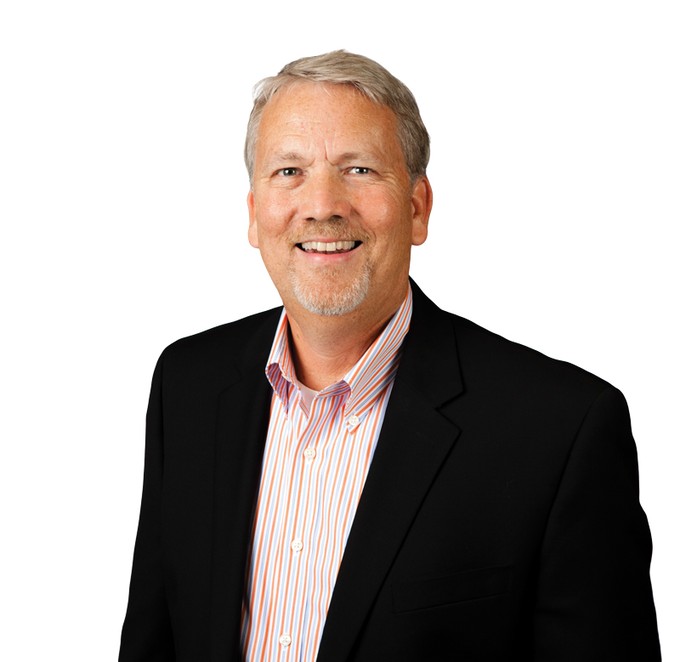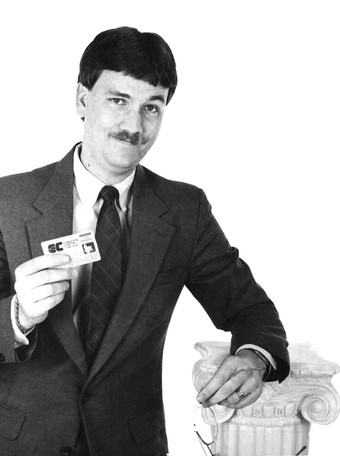
Over the past three decades, tens of thousands of alumni have come and gone from Biola, and one person has been their steady servant during all that time: Rick Bee (’79, M.A. ’90, Ph.D. ’01). During his 35-year tenure with alumni, most recently as senior director of alumni and parent relations, Bee — an affable and energetic three-time Biola alumnus himself — played a vital role in serving Biola graduates, launching memorable traditions and events, building a vibrant alumni network, raising funds for students and buildings, organizing regional chapters and even getting this very magazine off the ground.
Last year, faced with an opportunity to provide leadership in significant new fundraising efforts, Rick began transitioning into a new role at the university as senior director of advancement. After completing the handoff this spring to Lily Tsau, Rick sat down with Biola Magazine editor Jason Newell to reflect on his years of service to Biola’s alumni.
Rick, you’ve led Biola’s alumni department for over 35 years — minus a couple of years at another organization in the early ’90s. What is it about this community that made you want to serve here for all of these years?
It’s been a real joy, and the biggest part of that is our great alumni. Through the years, I’ve had the privilege of working with not only those that I went to school with, but those who came before me and those who have come after me. There are just so many people who are doing great things for the kingdom, and to come alongside and help meet their needs when they’ve got questions, or they’re trying to get transcripts, or they’re trying to meet somebody in a new location has been a real blessing. I don’t know how many thousands of alumni I’ve met through the years, but it’s a few, and that kind of experience is a blessing.

I just dug up the inaugural Spring 1986 issue of Biola Magazine, or Connections as it was first known. At the time, Biola’s alumni relations were pretty minimal, and it was your job to create an outreach program from scratch. What was it like for you in those early days?
It was really interesting because our alumni database was on 3-by-5 cards. Literally. So the first project was to computerize those — to convert those cards and get them into a database that kind of was the predecessor to what we have today. Once we had the flexibility to generate lists, we could mail to alumni by region.
And then the next thing was, as you mentioned, that we introduced Connections as the alumni publication. Much like the magazine today, it was designed to engage people in the life of the university and then hear back from them about what they were doing.
From back then to today, how would you describe just how much the Biola alumni community has grown and changed?
Those alumni cards, we might have had 5,000 to 10,000 active cards. And now we have about 65,000 alumni records in our database. Beyond numbers, the Alumni Board and the volunteerism of regional chapter leaders came out of those early years. We had the creation of alumni programs. We created the Christmas Tree Lighting. We created things like Midnight Madness. We created the Student Alumni Association; at one point we had the largest student-run student-alumni association in the country, with over 1,200 students involved. Those types of programs were cutting-edge when we created them.
Beyond the Christmas Tree Lighting and Midnight Madness, which of the other events and traditions have been your favorites?
I used to oversee commencement and putting together the commencement services, and I’ve continued to enjoy taking part in that. I’ve tried to think through how many alumni I’ve shaken hands with over the years, and it would probably be 25,000 to 30,000. It’s always been a privilege of mine to hand them the alumni license plate frame at graduation rehearsal. That was always a favorite, because I’ve been able to look into the eyes of each of these students and congratulate them.
I also love the regional chapter events, just because it allowed me to be out and hear from alumni in the regions where we have the chapters. It’s a good opportunity to get a pulse on the life and work of our alumni. Alumni Weekend has been great. Reunions are always a joy, just because you get people back who haven’t been on campus sometimes for 30 or 40 years.
It’s probably safe to say that you’ve met more Biola alumni than anyone. Which of them have made the biggest impression on you?
When I think about the most influential alumni, it’s not necessarily just people like [United States Sen.] John Thune or [major league all-star pitcher] Todd Worrell. I went back and visited an alumna who left Biola and went to teach in a rural school in Virginia. When she went there, there was no other educator in that entire region, and she spent her entire career working in this Appalachian schoolhouse. That was her calling and mission. Those are the alumni who most impact me, because they followed God’s calling for them to do some pretty amazing but unrecognized things. The coolest stories are those folks who were just faithful to God’s call.
I think short of heaven, we will not know the millions of lives that have been touched through Biola. Our alumni become pastors, missionaries, business owners, scientists and cinema and media arts grads. The influence that they have in their realms is spectacular.
Over the years, you’ve played an important role in helping supporters to see the value of what Biola is doing — and encouraging them to invest in students and building projects, like the library, Talbot East, the production center and others. What has been most rewarding about that?
Part of our philosophy of fundraising is that you share the need, but you wait on the Holy Spirit to move the heart. My favorite gifts are those that are obviously the hand of God — not anything that I’ve done or that Biola has done. Gifts like the Lim Center that have come in from people who have come to us, saying, “We want to be good stewards of what’s been entrusted to us, and we’ve thought about giving to Biola,” and then made that happen.
Tell us about the new role you’re playing at Biola as senior director of advancement.
The new role is primarily working to build funding for the upcoming campaign. One of my major responsibilities is cinema and media arts, getting their new building funded. But I’ll be working with a lot of our alumni, parents, friends and donors to accomplish the institutional mission through fundraising and stewardship — kind of taking what I teach in my “Faith and Money” class and broadening that to the donor population.
You handed the baton off this spring to Lily Tsau as the new senior director of alumni and parent relations. What are you looking forward to seeing as she steps into this role?
I’m excited to have Lily in this role. I think she’s going to bring some innovation to us. She’s experienced a larger alumni program — programs with more of a resource base, so she can bring some new and creative ideas. She’s also stepping into a really great staff of people who work with our alumni and parents. So I have a lot of really high expectations and hopes for her role. I have confidence that she’ll be able to continue to build on the relationships and the service model that has always been there for alumni.
 Biola University
Biola University


